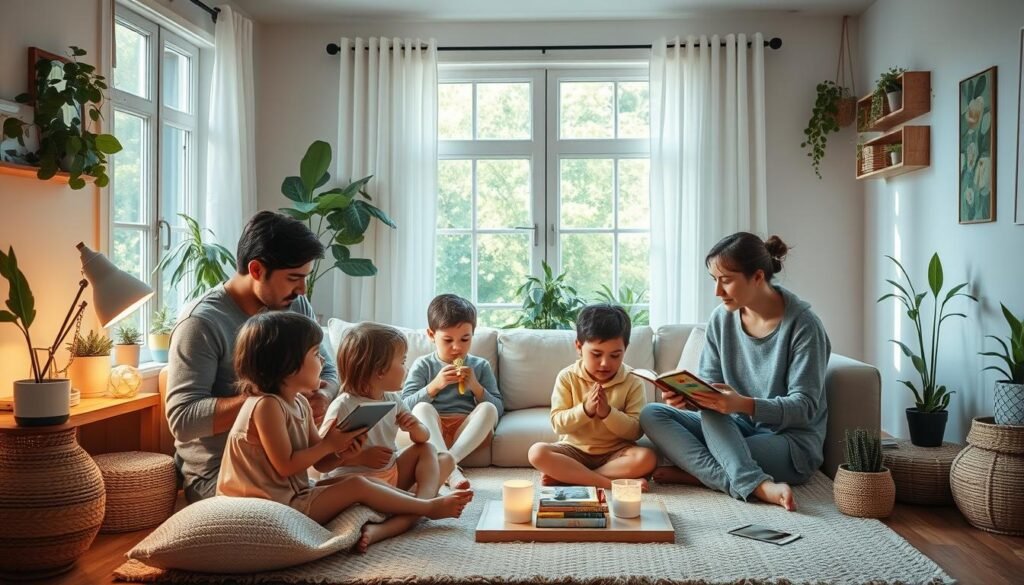As you navigate the challenges of parenting, you may wonder: is neurotic parenting worse than bad parenting? This question is timely in today’s world, where parenting styles keep changing. For insights and advice on parenting teenagers, check out parenting resources. They offer practical strategies for effective parenting.
Research shows neurotic parenting can make children more dependent and anxious1. The topic of neurotic parenting is gaining attention, with studies showing a shift in how we talk about parenting2.
Key Takeaways
- Neurotic parenting can have a lasting impact on a child’s personality and development.
- Bad parenting can also have negative effects on children, but the comparison between the two is complex.
- Understanding the differences between neurotic parenting and bad parenting is essential for making informed decisions.
- Parenting styles are constantly evolving, and it’s important to stay updated on the latest research and trends.
- Effective parenting requires a balance between care and control, and finding this balance is key to raising healthy and well-adjusted children.
When thinking about whether neurotic parenting is worse than bad parenting, remember each style has its own challenges and effects. By staying informed and adapting to new research and trends, you can make the best choices for your child’s growth and well-being.
Understanding Neurotic Parenting: The Anxiety-Driven Approach
When you think about parenting, you might wonder about “neurotic parenting.” It’s when parents worry too much about their child’s safety. This can make kids feel anxious and stressed3.
It’s important to know that neurotic parenting isn’t always “bad” parenting. But, it can harm kids by making them too dependent and anxious4. Let’s look at what makes neurotic parenting:
- Excessive worry and anxiety about the child’s safety and well-being
- Overly protective and restrictive behavior
- Difficulty setting boundaries and discipline
Studies show that a mom’s anxiety can affect her child’s mood and behavior. This shows why we need to work on neurotic parenting to help kids grow well.
| Characteristics of Neurotic Parents | Effects on Children |
|---|---|
| Excessive worry and anxiety | Increased anxiety and stress |
| Overly protective and restrictive behavior | Dependence and lack of autonomy |
| Difficulty setting boundaries and discipline | Difficulty with self-regulation and emotional control |
By understanding neurotic parenting, you can start making your parenting better. Next, we’ll look at what bad parenting is and how it affects kids.
Defining Bad Parenting: Beyond the Stereotypes
Understanding negative impact neurotic parenting is key to a child’s growth. Mark O’Connell says parenting is tough and often leads to partial failure5. Studies show that bad parenting can make kids more emotional as adults, leading to anger, depression, and anxiety5.
Bad parenting can affect kids in many ways. For example, too much helicopter parenting can make kids anxious and self-centered6. This parenting style can make kids unhappy and less emotionally smart6. Here are some signs of bad parenting:
- Lack of boundaries and discipline
- Overprotection and constant intervention
- Emotional unavailability and neglect
Parenting is complex and what works for one family might not work for another. Knowing the consequences of bad parenting and the negative impact neurotic parenting can have helps you create a better home for your child.
The main goal of parenting is to raise happy, healthy kids. By avoiding bad parenting and focusing on a positive home, you can help your child succeed56.
| Parenting Style | Characteristics | Effects on Children |
|---|---|---|
| Helicopter Parenting | Overprotection, constant intervention | Anxious, self-absorbed, lacking emotional literacy |
| Authoritative Parenting | Balance of discipline and nurturing | Happy, well-adjusted, emotionally intelligent |
Is Neurotic Parenting Worse Than Bad Parenting? The Scientific Perspective
Looking into how parenting styles affect kids, we must see it from a scientific view. Studies reveal that psychological effects neurotic parenting can deeply impact a child’s growth. A study found that a mother’s neuroticism can directly affect her child’s neuroticism and mental health7. This shows why it’s key to grasp how neurotic parenting affects kids’ emotional health.
A study with over 20,000 college students showed that neurotic parenting can lead to serious psychological effects like depression and anxiety7. Also, kids of neurotic parents often do worse in school and have lower health and BMI8. This underlines the need to understand why neurotic parenting is bad and its lasting effects on kids.
To learn more about neurotic parenting’s impact, check out this study on passing on neuroticism and emotional issues. The study’s results can help parents see why dealing with their own neuroticism is vital for their kids’ emotional health.
In summary, science shows us that parents need to know the psychological effects of their parenting style on their kids. By understanding the dangers of neurotic parenting, parents can create a better, supportive environment for their children to grow and succeed.
The Hidden Impact of Helicopter Parenting on Child Development

Understanding the differences between neurotic and bad parenting is key. Helicopter parents can shape their child’s personality in ways that aren’t good. Traits like dependence, neuroticism, and a lack of openness can develop9. This parenting style often means being too involved, always watching, and not giving enough freedom.
Studies show that overprotective parenting can make kids less assertive as adults9. By age 2 or 3, about 30% of kids might start showing anxiety if they’re not allowed to grow on their own9. This shows why finding a balance in parenting is so important.
Helicopter parenting can affect children in many ways. Some of these effects include:
- Increased dependence and neuroticism
- Lack of openness and assertiveness
- Difficulty with decision-making and boundary-setting
- Higher risk of anxiety and depression
It’s vital to know the differences between neurotic and bad parenting. Understanding these can help you create a better parenting environment. This way, you can support your child’s growth in a positive way10.
| Parenting Style | Effects on Child Development |
|---|---|
| Helicopter Parenting | Increased dependence, neuroticism, and anxiety |
| Neurotic Parenting | Higher risk of anxiety and depression in children |
| Bad Parenting | Negative impact on child’s emotional and psychological well-being |
Long-term Effects of Overprotective Parenting Styles
As a parent, you want the best for your child. But overprotective parenting can harm their academic success. Research shows kids of overprotective parents may find it hard to be independent and confident11. This is because they miss out on learning to solve problems and take risks, key for doing well in school.
Overprotective parenting also affects social skills. Kids who don’t get to play with others may find it tough to make friends11. They might not learn how to handle stress and tough situations, which is important for their emotional health.
Lastly, overprotective parenting can hurt a child’s emotional health. Kids who never face failure may struggle with anxiety and stress11. This can make them feel unhappy and stressed out, affecting their overall happiness.
Breaking the Cycle of Anxious Parenting
As a parent, you want the best for your child. But anxious parenting can harm their mental health. Finding balance is key to stop this cycle. Research shows many therapy clients grew up in anxious families12. This can make children anxious too, showing anxiety can pass down through generations12.
To stop this cycle, it’s important to know the signs of anxious parenting. Signs include catastrophizing, which can hurt mental health13. By being aware and taking action, you can create a healthier home for your child.
Here are some ways to find balance and reduce anxiety:
- Practice self-care and prioritize your own mental health
- Encourage open communication with your child and validate their feelings
- Model healthy coping mechanisms and problem-solving skills
By taking these steps, you can help your child grow emotionally strong. Remember, finding balance is a journey. It’s okay to take it slow. With patience and the right support, you can make a better future for your child. Studies show that anxious mothers can affect their children’s anxiety and depression.
| Signs of Anxious Parenting | Effects on Children |
|---|---|
| Catastrophizing | Increased anxiety and vulnerability to mental illnesses |
| Overprotection | Decreased emotional resilience and independence |
Finding Balance: The Middle Ground Between Care and Control
As a parent, finding the right balance is key. Creating healthy boundaries lets your kids grow on their own. This means setting clear expectations and encouraging open communication. It’s important for their emotional and psychological health14.
Here are some ways to set healthy boundaries:
- Establishing clear rules and consequences
- Encouraging independence and self-reliance
- Practicing active listening and empathy
These strategies help your kids make their own decisions. They also build a strong sense of self15.
Creating healthy boundaries takes effort and dedication. Being consistent and patient helps your kids develop important skills. This way, they can succeed in life and build trust with you14.
| Strategy | Benefits |
|---|---|
| Creating healthy boundaries | Encourages independence and self-reliance |
| Building trust with your children | Fosters emotional and psychological well-being |
Transform Your Parenting Style: Practical Steps

Changing your parenting style needs careful thought and action. First, pinpoint the areas you want to improve. Then, find practical ways to make those changes. This could mean looking for resources like books or online classes to learn new methods.
By doing this, you start to build a better environment for your child to grow. This environment is key for your child’s success.
Managing stress and anxiety is a big part of changing how you parent. You can try deep breathing or finding healthy ways to show your feelings. This helps you stay calm and patient, which is great for your child’s growth16.
Other ways to change your parenting include:
- Setting clear rules and expectations
- Listening well and showing empathy
- Encouraging your child to talk openly
Using these methods can help you build a stronger, more loving bond with your child. Changing your parenting style is a journey that takes time and effort. But, the benefits are huge. With patience and the right support, you can become a more caring and effective parent. This is key for transforming your parenting style and improving your child’s future.
The Role of Professional Support in Changing Parenting Patterns
Parenting comes with its own set of challenges. Recognizing the value of professional support is key. Experts can help you spot areas for improvement and teach you how to create a better environment for your child. Studies show that overinvolved parenting can harm a child’s development, leading to issues like dependence and neuroticism17.
Seeking professional support is a big step towards better parenting. This could mean therapy, counseling, or coaching. These resources offer the tools and advice you need to change for the better. By getting help, you can avoid patterns that might hurt your relationship with your child and adopt a more nurturing style. For example, research shows that kids today feel more pressure from their parents than ever before, making professional support even more important17.
Benefits of professional support include:
* Understanding your child’s needs better
* Learning to communicate more effectively
* Setting healthy boundaries and disciplining your child
* Building a stronger bond with your child
By embracing the role of professional support, you can start making your parenting more positive. Working with a professional, you can create a plan tailored to your needs. This will help you move towards a more balanced and caring parenting style18.
| Benefits of Professional Support | Description |
|---|---|
| Improved Communication | Develop effective communication strategies to strengthen your relationship with your child |
| Healthy Boundaries | Learn how to set healthy boundaries and discipline your child in a positive and supportive way |
| Stronger Relationship | Build a stronger, more supportive relationship with your child through personalized guidance and support |
Remember, asking for professional support is a sign of strength, not weakness. It shows you’re willing to improve for your child’s sake. By doing so, you can create a better environment and adopt a more caring parenting approach19.
Conclusion: Creating a Healthier Parenting Dynamic
Starting your parenting journey means finding the right balance between care and control20. It’s natural to want to protect your kids, but too much worry can harm them. Instead, aim to create a space where they can grow independent, emotionally strong, and build good relationships.
Working on your own anxieties and changing your parenting can help your kids reach their best20. If you need help, get professional advice. Remember, a bit of independence is key to raising confident kids.
The secret to better parenting is to face challenges with empathy, open talk, and a flexible mindset212220. Embrace the journey and trust that a caring yet structured environment will help your kids succeed.
FAQ
What are the key characteristics of neurotic parents?
What are the common triggers for neurotic parenting behavior?
How does the role of personal anxiety impact parenting decisions?
How do the psychological outcomes of neurotic parenting and bad parenting compare?
How can helicopter parenting impact child development?
What are the long-term effects of overprotective parenting styles?
How can parents break the cycle of anxious parenting?
How can parents create a healthy balance between care and control?
What practical steps can parents take to transform their parenting style?
How can professional support help parents change their parenting patterns?
Source Links
- ‘Helicopter’ Parents Have Neurotic Kids, Study Suggests – https://www.livescience.com/10663-helicopter-parents-neurotic-kids-study-suggests.html
- Child rearing and the neuroticization of parenting: the case of The Netherlands – https://research.vu.nl/files/1833250/148662.pdf
- Rearing Difficult Children: Parents’ Personality and Children’s Proneness to Anger as Predictors of Future Parenting – https://pmc.ncbi.nlm.nih.gov/articles/PMC3018753/
- At Neuroticism’s Core May Be This Underlying Source of Anxiety – https://www.psychologytoday.com/us/blog/fulfillment-at-any-age/202212/at-neuroticisms-core-may-be-this-underlying-source-of-anxiety
- PERCEPTIONS OF CHILDHOOD RELATIONSHIPS WITH MOTHER AND FATHER: DAILY EMOTIONAL AND STRESSOR EXPERIENCES IN ADULTHOOD – https://pmc.ncbi.nlm.nih.gov/articles/PMC3468907/
- Bad therapy is stunting our kids – https://unherd.com/2024/02/bad-therapy-is-stunting-our-kids/
- Why you should lower your expectations for your kids. (No, seriously) – https://www.deseret.com/2022/4/2/23004815/why-parental-expectations-are-a-gift-that-can-be-worse-than-criticism-for-kids/
- How parents’ personalities shape children’s lives – https://source.washu.edu/2023/03/how-parents-personalities-shape-childrens-lives/
- Understanding The Developmental Trauma That Happens When Parents Don’t Help A Child Separate & Individuate – https://lissarankinmd.substack.com/p/understanding-the-developmental-trauma
- Stop Putting Your Kids First – https://www.huffpost.com/entry/kids-come-first-but-only-_b_825472
- A Psychologist Calls Out The Many Dangers Of Helicopter Parenting – https://www.forbes.com/sites/traversmark/2022/11/30/a-psychologist-calls-out-the-many-dangers-of-helicopter-parenting/
- Raised by Anxious Parents? Here’s How it Might Be Affecting Your Mental Health — Talkspace – https://www.talkspace.com/mental-health/conditions/articles/raised-by-anxious-parents-heres-how-it-might-be-affecting-your-mental-health/
- Catastrophising: How toxic thinking leads you down dark paths – https://www.bbc.com/worklife/article/20220725-catastrophising-how-toxic-thinking-can-lead-down-dark-path
- The Bad Seed – https://www.metafilter.com/93708/The-Bad-Seed
- Family – https://link.springer.com/chapter/10.1007/978-1-60761-256-8_5
- Is Parenting Overrated? – Open to Debate – https://opentodebate.org/debate/parenting-overrated/
- Rising parental expectations linked to perfectionism in college students – https://www.apa.org/news/press/releases/2022/03/parental-expectations-perfectionism
- I’m OK, You’re OK Parenting: Guilt | Family Matters – https://www.ronitbaras.com/family-matters/parenting-family/im-ok-youre-ok-parenting-guilt/
- The Isolation of Intensive Parenting – https://www.theatlantic.com/family/archive/2025/01/intensive-parenting-village-child-care-incompatible/681113/
- Here’s Why Experts Don’t Recommend the Authoritarian Parenting Style – https://www.parents.com/parenting/better-parenting/style/authoritarian-parenting-the-pros-and-cons-according-to-a-child-psychologist/
- Evolution, Philosophy of Raising of Children, Parenting Tips for Good Fun Kids, Learning with Play – https://www.spaceandmotion.com/health/positive-parenting.htm
- Public Health Significance of Neuroticism – https://pmc.ncbi.nlm.nih.gov/articles/PMC2792076/








0 responses to “Is Neurotic Parenting Worse Than Bad Parenting?”